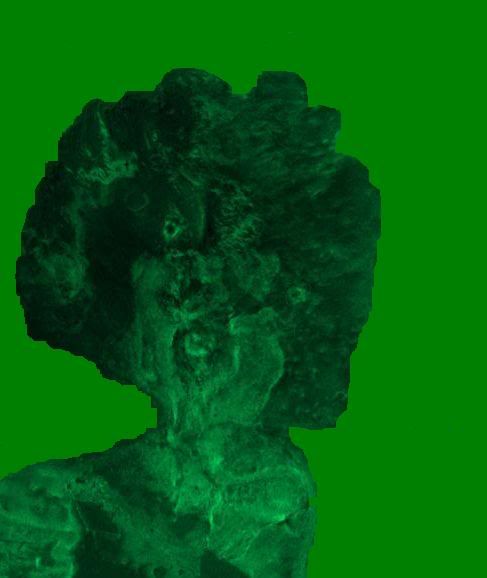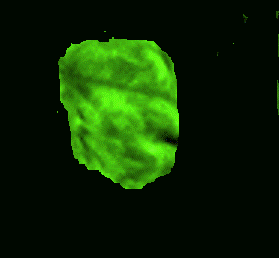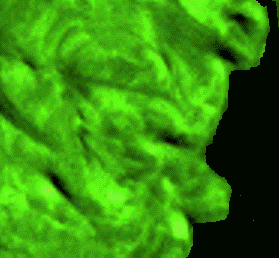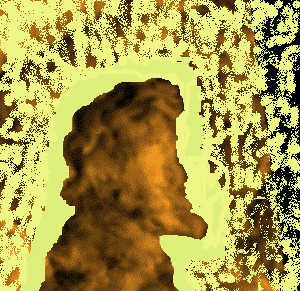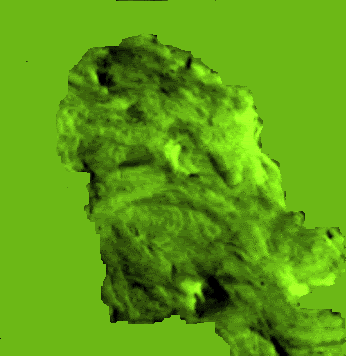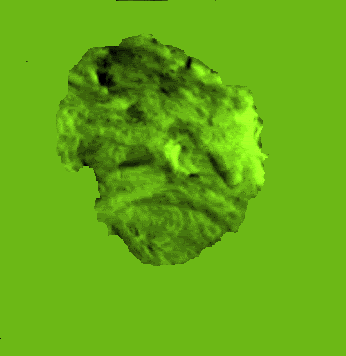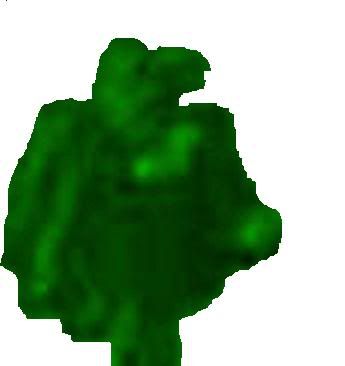- Thank you received: 0
T or E
- tvanflandern
-
- Offline
- Platinum Member
-

Less
More
18 years 11 months ago #8923
by tvanflandern
Replied by tvanflandern on topic Reply from Tom Van Flandern
<blockquote id="quote"><font size="2" face="Verdana, Arial, Helvetica" id="quote">quote:<hr height="1" noshade id="quote"><i>Originally posted by rderosa</i>
<br />Tom, would you care to weigh in on the difference between these two images?<hr height="1" noshade id="quote"></blockquote id="quote"></font id="quote">No one has ever accused me of being politically correct. But in this instance, both sides have made valid points.
On the issue of artrificiality of these images, I side squarely with JR in agreeing that no amount of detail can guaranty that images are not the products of nature and random chance. An arial image of a terrestrial mountain scene circulated SPSR several years ago (I wish I could relocate it), and in it one could find perhaps a dozen fairly good quality faces that were unquestionably functions of viewing angle or "tricks of light and shadow". However, many of them were cartoonish or grotesque.
To establish artificiality, one needs something predicted a priori at long odds against chance (as opposed to these new a posteriori finds), or else a context or relationships that are beyond chance. This latter criterion requires that one can make an argument persuasive even to skeptics that a certain type of context or relationship is so clear a priori that it did not need to be said or written in advance to qualify as an a priori condition.
On the other hand, given proved artificiality elsewhere, then artificiality is no longer an extraordinary hypothesis. Given the various possible interpretations of these new images, artificiality then easily rises to the top of the list as the most reasonable. So the DeRosas' activities serve an invaluable function in helping get answers to what is really going on with this former Martian civilization.
Rich and Neil need to remember that JR is not yet convinced that any case of artificiality is proved beyond a reasonable doubt. So he naturally concludes that pareidolia is the most reasonable explanation for all your finds. JR needs to remember that, if he ever became convinced of a single instance of artificiality, his view of the relative probabilities would change too, and pareidolia would no longer be the most likely explanation.
It would be a good idea if the DeRosas reminded readers every other page that their work presumes that some artificiality is already an established fact, which is what empowers them to conclude that these flat art images are also most likely artificial. But without that background, you would yourselves be just as skeptical as many new viewers to whom you try to show these images, and properly so. -|Tom|-
<br />Tom, would you care to weigh in on the difference between these two images?<hr height="1" noshade id="quote"></blockquote id="quote"></font id="quote">No one has ever accused me of being politically correct. But in this instance, both sides have made valid points.
On the issue of artrificiality of these images, I side squarely with JR in agreeing that no amount of detail can guaranty that images are not the products of nature and random chance. An arial image of a terrestrial mountain scene circulated SPSR several years ago (I wish I could relocate it), and in it one could find perhaps a dozen fairly good quality faces that were unquestionably functions of viewing angle or "tricks of light and shadow". However, many of them were cartoonish or grotesque.
To establish artificiality, one needs something predicted a priori at long odds against chance (as opposed to these new a posteriori finds), or else a context or relationships that are beyond chance. This latter criterion requires that one can make an argument persuasive even to skeptics that a certain type of context or relationship is so clear a priori that it did not need to be said or written in advance to qualify as an a priori condition.
On the other hand, given proved artificiality elsewhere, then artificiality is no longer an extraordinary hypothesis. Given the various possible interpretations of these new images, artificiality then easily rises to the top of the list as the most reasonable. So the DeRosas' activities serve an invaluable function in helping get answers to what is really going on with this former Martian civilization.
Rich and Neil need to remember that JR is not yet convinced that any case of artificiality is proved beyond a reasonable doubt. So he naturally concludes that pareidolia is the most reasonable explanation for all your finds. JR needs to remember that, if he ever became convinced of a single instance of artificiality, his view of the relative probabilities would change too, and pareidolia would no longer be the most likely explanation.
It would be a good idea if the DeRosas reminded readers every other page that their work presumes that some artificiality is already an established fact, which is what empowers them to conclude that these flat art images are also most likely artificial. But without that background, you would yourselves be just as skeptical as many new viewers to whom you try to show these images, and properly so. -|Tom|-
Please Log in or Create an account to join the conversation.
18 years 11 months ago #16167
by rderosa
Replied by rderosa on topic Reply from Richard DeRosa
<blockquote id="quote"><font size="2" face="Verdana, Arial, Helvetica" id="quote">quote:<hr height="1" noshade id="quote"><i>Originally posted by tvanflandern</i>
<br />On the issue of artrificiality of these images, I side squarely with JR in agreeing that no amount of detail can guaranty that images are not the products of nature and random chance.<hr height="1" noshade id="quote"></blockquote id="quote"></font id="quote">
Tom, I see what you're saying in most of your message. I guess I inherently have a small problem with this statement, though, and that's the root of my problem with what jrich is doing. It's counter-intuitive to me, that "no amount of detail" changes things. Is that really true? That seems a little like the trained monkey argument, but I will admit that if that's true, that would change things. But only slightly.
<blockquote id="quote"><font size="2" face="Verdana, Arial, Helvetica" id="quote">quote:<hr height="1" noshade id="quote"><i>Originally posted by tvanflandern</i>
<br />However, many of them were cartoonish or grotesque..<hr height="1" noshade id="quote"></blockquote id="quote"></font id="quote">
Yes, for the most part, I think we're trying to avoid that, but I did throw in a couple for laughs.
<blockquote id="quote"><font size="2" face="Verdana, Arial, Helvetica" id="quote">quote:<hr height="1" noshade id="quote"><i>Originally posted by tvanflandern</i>
But without that background, you would yourselves be just as skeptical as many new viewers to whom you try to show these images, and properly so.<hr height="1" noshade id="quote"></blockquote id="quote"></font id="quote">
I should dig out my emails to Neil, if I can find them, from when he first started to show me this latest crop of images. I accused him of pareidolia....HA! But only for awhile, until I saw "Clown". You see, there's a point at which I would be doubting my own senses. It get's silly, after awhile, calling it all pareidolia.
rd
<br />On the issue of artrificiality of these images, I side squarely with JR in agreeing that no amount of detail can guaranty that images are not the products of nature and random chance.<hr height="1" noshade id="quote"></blockquote id="quote"></font id="quote">
Tom, I see what you're saying in most of your message. I guess I inherently have a small problem with this statement, though, and that's the root of my problem with what jrich is doing. It's counter-intuitive to me, that "no amount of detail" changes things. Is that really true? That seems a little like the trained monkey argument, but I will admit that if that's true, that would change things. But only slightly.
<blockquote id="quote"><font size="2" face="Verdana, Arial, Helvetica" id="quote">quote:<hr height="1" noshade id="quote"><i>Originally posted by tvanflandern</i>
<br />However, many of them were cartoonish or grotesque..<hr height="1" noshade id="quote"></blockquote id="quote"></font id="quote">
Yes, for the most part, I think we're trying to avoid that, but I did throw in a couple for laughs.
<blockquote id="quote"><font size="2" face="Verdana, Arial, Helvetica" id="quote">quote:<hr height="1" noshade id="quote"><i>Originally posted by tvanflandern</i>
But without that background, you would yourselves be just as skeptical as many new viewers to whom you try to show these images, and properly so.<hr height="1" noshade id="quote"></blockquote id="quote"></font id="quote">
I should dig out my emails to Neil, if I can find them, from when he first started to show me this latest crop of images. I accused him of pareidolia....HA! But only for awhile, until I saw "Clown". You see, there's a point at which I would be doubting my own senses. It get's silly, after awhile, calling it all pareidolia.
rd
Please Log in or Create an account to join the conversation.
- neilderosa
-
- Offline
- Platinum Member
-

Less
More
- Thank you received: 0
18 years 11 months ago #8924
by neilderosa
Replied by neilderosa on topic Reply from Neil DeRosa
<blockquote id="quote"><font size="2" face="Verdana, Arial, Helvetica" id="quote">quote:<hr height="1" noshade id="quote">It would be a good idea if the DeRosas reminded readers every other page that their work presumes that some artificiality is already an established fact, Tom<hr height="1" noshade id="quote"></blockquote id="quote"></font id="quote">
Point taken. Just above I said that no matter how cynical I get (of mainstream science), I think it's is virtually certain that the Cydonia Face in fact exists on Mars, and that Tom and others have made a very good case for artificialty there. And that's a good context to keep in mind. I also said that there have been two confirmations of the Profile Image (& Co.), and I would like to see more rigorous research on these and other images.
However with regard to at least some of these new faces, I maintain that at this point pareidolia is out of the question on the philosophical grounds of <i>reductio ad adsurdum </i>.
The common sense argument is good enough after a certain point. If we can't rely on our own senses to make judgments, we would never be able to know anything, and we would be left with philosophical solipsism (nothing in the universe is real to the observer but his own conscious mind.) However, I grant that we can not prove it yet.
A perfect <i>apriori</i> example (whether digital or real) would be to uncover the grid over the Ugly Woman's (see above) Baby's Head. If there's a baby under the block-out, it would go a long way toward proving artificiality, but of what kind I don't know.
Neil
Point taken. Just above I said that no matter how cynical I get (of mainstream science), I think it's is virtually certain that the Cydonia Face in fact exists on Mars, and that Tom and others have made a very good case for artificialty there. And that's a good context to keep in mind. I also said that there have been two confirmations of the Profile Image (& Co.), and I would like to see more rigorous research on these and other images.
However with regard to at least some of these new faces, I maintain that at this point pareidolia is out of the question on the philosophical grounds of <i>reductio ad adsurdum </i>.
The common sense argument is good enough after a certain point. If we can't rely on our own senses to make judgments, we would never be able to know anything, and we would be left with philosophical solipsism (nothing in the universe is real to the observer but his own conscious mind.) However, I grant that we can not prove it yet.
A perfect <i>apriori</i> example (whether digital or real) would be to uncover the grid over the Ugly Woman's (see above) Baby's Head. If there's a baby under the block-out, it would go a long way toward proving artificiality, but of what kind I don't know.
Neil
Please Log in or Create an account to join the conversation.
- neilderosa
-
- Offline
- Platinum Member
-

Less
More
- Thank you received: 0
18 years 11 months ago #8925
by neilderosa
Replied by neilderosa on topic Reply from Neil DeRosa
<blockquote id="quote"><font size="2" face="Verdana, Arial, Helvetica" id="quote">quote:<hr height="1" noshade id="quote">On the issue of artrificiality of these images, I side squarely with JR in agreeing that no amount of detail can guaranty that images are not the products of nature and random chance. [Tom]<hr height="1" noshade id="quote"></blockquote id="quote"></font id="quote">
Technically, by the scientific method this is correct. Rigid methodologicl rules are how you guard against rampant subjectivism, and bias. However, we are not arguing against established scientific theories or conclusions here. We are arguing against jrich's and other debunkers' biases that no matter what, they will not accept the POSSIBILITY of artificiality, either on MARS, or in a hacker's computer.
In order to form a hypothesis or a working theory you have to start somewhere. So you start out with reasonable, educated guesses which you make on the basis of common sense and preliminary evidence. The rigorous proofs of the kind Tom is talking about, come later. But the debunkers are allowing for no possibility of artificiality no matter how much good common sense evidence comes in. They don't want to start the process, period. We think we are gathering a prepopnerance of good evidence from which to carry out further tests. But eventually, official science will have to get on board. If they don't, one of the international competitors will--eventually.
Neil
Technically, by the scientific method this is correct. Rigid methodologicl rules are how you guard against rampant subjectivism, and bias. However, we are not arguing against established scientific theories or conclusions here. We are arguing against jrich's and other debunkers' biases that no matter what, they will not accept the POSSIBILITY of artificiality, either on MARS, or in a hacker's computer.
In order to form a hypothesis or a working theory you have to start somewhere. So you start out with reasonable, educated guesses which you make on the basis of common sense and preliminary evidence. The rigorous proofs of the kind Tom is talking about, come later. But the debunkers are allowing for no possibility of artificiality no matter how much good common sense evidence comes in. They don't want to start the process, period. We think we are gathering a prepopnerance of good evidence from which to carry out further tests. But eventually, official science will have to get on board. If they don't, one of the international competitors will--eventually.
Neil
Please Log in or Create an account to join the conversation.
18 years 11 months ago #16019
by emanuel
Replied by emanuel on topic Reply from Emanuel Sferios
Neil,
Can you post keys alongside of the original, rather than alone? It's very important to have the original next to the key so you can see if there has been any pareidolia-based cropping bias going on. To give an example of what I mean by pareidolia-based cropping bias, check out the "dolphin" key below, which is from Tom's slideshow.
The top image is the original. The image on the bottom left is the key from the slideshow, which I think contains this bias. The bottom-right image is my own key, which I think is more objective. In particular, this bias is reflected in the cropping of the "fin," which simply does not exist. Rather, there is what looks more like rabbit ears on the top of the dolphin's back. It is likely that pareidolia caused the person who cropped this key not to notice the rabbit ears, but to imagine a fin.
Emanuel
Can you post keys alongside of the original, rather than alone? It's very important to have the original next to the key so you can see if there has been any pareidolia-based cropping bias going on. To give an example of what I mean by pareidolia-based cropping bias, check out the "dolphin" key below, which is from Tom's slideshow.
The top image is the original. The image on the bottom left is the key from the slideshow, which I think contains this bias. The bottom-right image is my own key, which I think is more objective. In particular, this bias is reflected in the cropping of the "fin," which simply does not exist. Rather, there is what looks more like rabbit ears on the top of the dolphin's back. It is likely that pareidolia caused the person who cropped this key not to notice the rabbit ears, but to imagine a fin.
Emanuel
Please Log in or Create an account to join the conversation.
- neilderosa
-
- Offline
- Platinum Member
-

Less
More
- Thank you received: 0
18 years 11 months ago #16020
by neilderosa
Replied by neilderosa on topic Reply from Neil DeRosa
Here are some more keys: All have been posted in the last couple of days, scroll up for same nickname to find strip ID number. As usual, the only enhancement is contrast and brightness, and sometimes color. Keys are simply the same realistic picture with border framed or matted. Note, some faces have two faces in one.
"Ugly Woman."
"Piniocio."
Pinoccio profile.
"Philosopher."
Frozen man with dog.
"Frozen Sleep," (dog omitted).
"Standing Eagle."
Neil
"Ugly Woman."
"Piniocio."
Pinoccio profile.
"Philosopher."
Frozen man with dog.
"Frozen Sleep," (dog omitted).
"Standing Eagle."
Neil
Please Log in or Create an account to join the conversation.
Time to create page: 0.411 seconds


